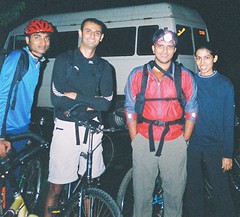Sindya signed me up for a 3 day class taught by the Teachers Training Foundation in Bangalore - it's an orientation meant for volunteers that are going to take part in the Reading For Real program next year.
Sindya and I have signed up for a few months next year; we'll be storytelling some books to young children who don't have a strong grasp of english, and encouraging them to read.
The training was awesome (though I bunked Friday because of work). I met a bunch of cool people. We learnt about pre/during/post reading activities aimed at holding the children's interest in the story and making sure they grasped it. We got a demo from an amazing storyteller - she had a room full of adults completely mesmerized by her rendition of a story meant for 6 year olds!

On Saturday night, I signed up to do an all-night bicycle ride. We met up at M.G. Road at 10pm. The organizers piled us into a van and took us to a house south of bangalore, off Kanakpura road, where they had a bunch of cycles. The cycles weren't that great at all - no gears, not the perfect size (too small for me), and a little rickety. They didn't provide helmets either. I was a little disappointed, given that we had paid Rs. 700 for the outing. Anyways, we started with an 8-9 km ride on the highway (it was about 11:45 by the time we started so not too much traffic) after which we took a detour into some small village roads. The roads were super muddy from the heavy rain that we've been having, and generally bumpy because they're inner roads. Needless to say, my backside was in severe pain by the end of the ride. We finished the appx 40km ride at about 5:15am. I had to walk the last 1-2 km of the ride because (a) my butt was sore, (b) the last 9km was uphill, (c) my back tire was pretty flat so it was superhard to ride.
Anyways, I reached home at 7am, took a shower and passed out. At 9:30am I had to pull myself out of bed and spend the entire day (10-5) in the TTF class again.
I ended up getting two movies from vikas - Les triplettes de Belleville (which I'd seen before) and The House of Flying Daggers, which I wanted to see. I finally passed out at 10pm.
It's somehow Tuesday already and I'm down with a terrible cough and cold. I'm guessing it's partly to do with a hectic weekend.